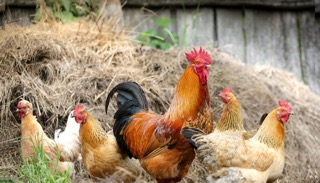What Age Chicken to Buy - A beginners guide to getting the right chickens for you
What age chicken should I buy?
Yay! You’re getting chickens! You might already have your chicken coop all set up, have researched different breeds, and know where to buy chickens, but there is one more decision - what age chickens to buy.
That’s right, you can buy chickens at any age you like: from cute, fluffy chicks right up to retired layers like rescue hens.
So what is the best age chicken to buy? Every age has different pros and cons, from cost to the breeds available.
Before looking at the pros and cons of the different options, you need to think about why you are getting chickens.
What age chickens can you buy?
You can buy chickens at almost any age. Here are the most common options, so that you know what to ask for:
- Fertilised eggs - These eggs are ready for incubation
- Day-old chicks - Chicks need a brooder with a heat source to keep them warm. Some day-old chicks are 'sexed' which means you can just get hens.
- Pullets - Pullets are birds with adult feathers. They no longer require a brooder or heat source, but they aren't yet old enough to produce eggs.
- Point of lay birds - These hens are the right age to begin producing eggs.
- Adult birds - Adult hens are proven layers and are often purchased as breeding stock.
- Rescue hens - Rescue birds are "retired" layers from commercial farms, although they will usually still be producing eggs. They are 2-3 years old and would be killed if they were not rescued.
Why are you getting chickens?
The reason why you are getting chickens will help decide the best age birds to buy
| Reason for getting chickens | The best age chicken to buy |
| As pets | Chicks usually make the best pets because they more easily bond with you. Choose sexed chicks over eggs, unless you have a plan for the roosters! Rescue hens are another good option because you are really making a difference in their lives. |
| For eggs | Pullets and point-of-lay birds are going to produce eggs most quickly and reliably, and for the longest period. What ever you buy, choose sexed birds so that you aren't feeding unwanted roosters! |
| To save money | Fertilised eggs or day-old chicks are the cheapest option but you will be feeding the birds for months before eggs are produced, so unless you are already set up and plan to sell (or eat!) the roosters, these aren't actually the cheapest option. Do the math, but you'll likely find more expensive pullets or point of lay birds are actually cheaper. |
| For the kids | Fertilised eggs or day-old chicks provide the best opportunity to experience the wonders of nature and engage with the food supply. Alternatively, rescue hens provide an opportunity for kids to understand industrial farming. |
If you have no experience with chickens, you may like to start out with older birds like pullets because they require less set up and attention.
Many experienced chicken keepers prefer to raise their own birds from eggs. This gives you more control over genetics and your flock. Fertilised eggs also provide the most affordable access to rare breeds and specialised genetics.
What are the pros and cons of different aged chickens?
Fertilised eggs
Fertilised eggs are obviously the most natural way to get chickens. They can be hatched in an incubator or under a broody hen.
| Pros | Cons |
|
|
Day-old chicks
Day-old chicks are absolutely adorable little balls of fluff, but raising chicks can be labour-intensive.
| Pros | Cons |
|
|
Pullets
Pullets are often the most economical option - they are closer to laying than chicks and don't require a brooder. They are cheaper than older birds but more expensive than chicks or eggs.
| Pros | Cons |
|
|
Point of lay birds
Point of lay birds are not cheap, but you can expect an egg within weeks of purchase!
| Pros | Cons |
|
|
Adult birds
These birds are adults and the hens are proven layers. If bought from stores, laying hens are usually in their first year of laying, but chickens bought online or from the classifieds can be any age.
| Pros | Cons |
|
|
Rescue hens
Rescue hens usually come from a commercial farm and have been rescued from being culled.
| Pros | Cons |
|
|
Age and quarantine
Another factor to keep in mind is disease risk. The older a chicken is, the more likely it is to be carrying parasites and diseases.
If you are starting a new flock from scratch, this might not matter so much as your new birds will all be exposed to the disease anyway. But if you already have chickens, younger birds might be a better choice as they are less likely to introduce new parasites or diseases to your flock. Chicks are safest, followed by pullets.
If you do choose to introduce new birds to an established flock, they should always go through quarantine first. And here are some tips on reducing bullying when introducing new birds to the flock.
Happy chicken keeping!
Rachael at Dine a Chook






